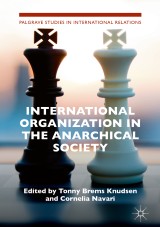Details

International Organization in the Anarchical Society
The Institutional Structure of World OrderPalgrave Studies in International Relations
|
213,99 € |
|
| Verlag: | Palgrave Macmillan |
| Format: | |
| Veröffentl.: | 23.05.2018 |
| ISBN/EAN: | 9783319716220 |
| Sprache: | englisch |
Dieses eBook enthält ein Wasserzeichen.
Beschreibungen
This book takes up one of the key theoretical challenges in the English School’s conceptual framework, namely the nature of the institutions of international society. It theorizes their nature through an analysis of the relationship of primary and secondary levels of institutional formation, so far largely ignored in English School theorizing, and provides case studies to illuminate the theory. Hitherto, the School has largely failed to study secondary institutions such as international organizations and regimes as autonomous objects of analysis, seeing them as mere materializations of primary institutions. Building on legal and constructivist arguments about the constitutive character of institutions, it demonstrates how primary institutions frame secondary organizations and regimes, but also how secondary institutions construct agencies with capacities that impinge upon and can change primary institutions. Based on legal and constructivist ideas, it develops a theoretical model thatsees primary and secondary institutions as shared understandings enmeshed in observable historical processes of constitution, reproduction and regulation.
<div>1 Introduction: A New Approach to International Organization - Cornelia Navari and Tonny Brems Knudsen.- 2 Fundamental Institutions and International Organizations: Theorizing Continuity and Change - Tonny Brems Knudsen.- 3 Modeling the Relations of Fundamental Institutions and International Organizations - Cornelia Navari.- 4 Institutional Constraints and Institutional Tensions in the Reform of the UN Security Council - Charlotta Friedner Parrat.- 5 Institutionalizing Morality: The UN Security Council and the Fundamental Norms of the International Legal Order - Dennis R. Schmidt.- 6 International Sanctions as a Primary Institution of International Society - Peter Wilson and Joanne Yao.- 7 China, Great Power Management and Environmental Stewardship: Negotiating Responsibility for Climate Change at the UN - Sanna Kopra.- 8 Fundamental Institutions and International Organizations: Solidarist Architecture - Tonny Brems Knudsen.- 9 Competing Norms and Norm Change: Intellectual Property Rights and Public Health in the World Trade Organization - Eero Palmujoki.- 10 Global International Society, Regional International Societies and Regional International Organizations: A Data Set of Primary Institutions - Filippo Costa Buranelli.- 11 The European Union between Solidarist Change and Pluralist Re-Enactment - Bettina Ahrens.- 12 Primary and Secondary Institutions in Regional International Society: Sovereignty and the League of Arab States - Raslan Ibrahim.- 13 Primary Institutional Dynamics and the Emergence of Regional Governance in Southeast Asia: Constructing Post-Colonial International Societies - Kilian Spandler.</div>
<p><b>Tonny Brems Knudsen</b> is Associate Professor in the Department of Political Science at Aarhus University, Denmark. </p> <p><b>Cornelia Navari</b> is Honorary Senior Lecturer at the University of Birmingham, UK, and Visiting Professor of International Affairs at the University of Buckingham, UK.</p>
<p>This book takes up one of the key theoretical challenges in the English School’s conceptual framework, namely the nature of the institutions of international society. It theorizes their nature through an analysis of the relationship of primary and secondary levels of institutional formation, so far largely ignored in English School theorizing, and provides case studies to illuminate the theory. Hitherto, the School has largely failed to study secondary institutions such as international organizations and regimes as autonomous objects of analysis, seeing them as mere materializations of primary institutions. Building on legal and constructivist arguments about the constitutive character of institutions, it demonstrates how primary institutions frame secondary organizations and regimes, but also how secondary institutions construct agencies with capacities that impinge upon and can change primary institutions. Based on legal and constructivist ideas, it develops a theoretical model that sees primary and secondary institutions as shared understandings enmeshed in observable historical processes of constitution, reproduction and regulation.</p><p><b>Tonny Brems Knudsen</b> is Associate Professor in the Department of Political Science at Aarhus University, Denmark. </p><p><b>Cornelia Navari</b> is Honorary Senior Lecturer at the University of Birmingham, UK, and Visiting Professor of International Affairs at the University of Buckingham, UK.</p>
Analyzes the relationship between primary and secondary levels of institutional formation, so far largely ignored in English School theorizing Develops a unique theoretical model based on legal and constructivist ideas Uses case studies to illustrate theory of international organizations and regimes as autonomous objects of analysis
Diese Produkte könnten Sie auch interessieren:

Inclusión educativa de niños, niñas y adolescentes migrantes venezolanos, en Colombia

von: Douglas Jiménez

15,99 €
















